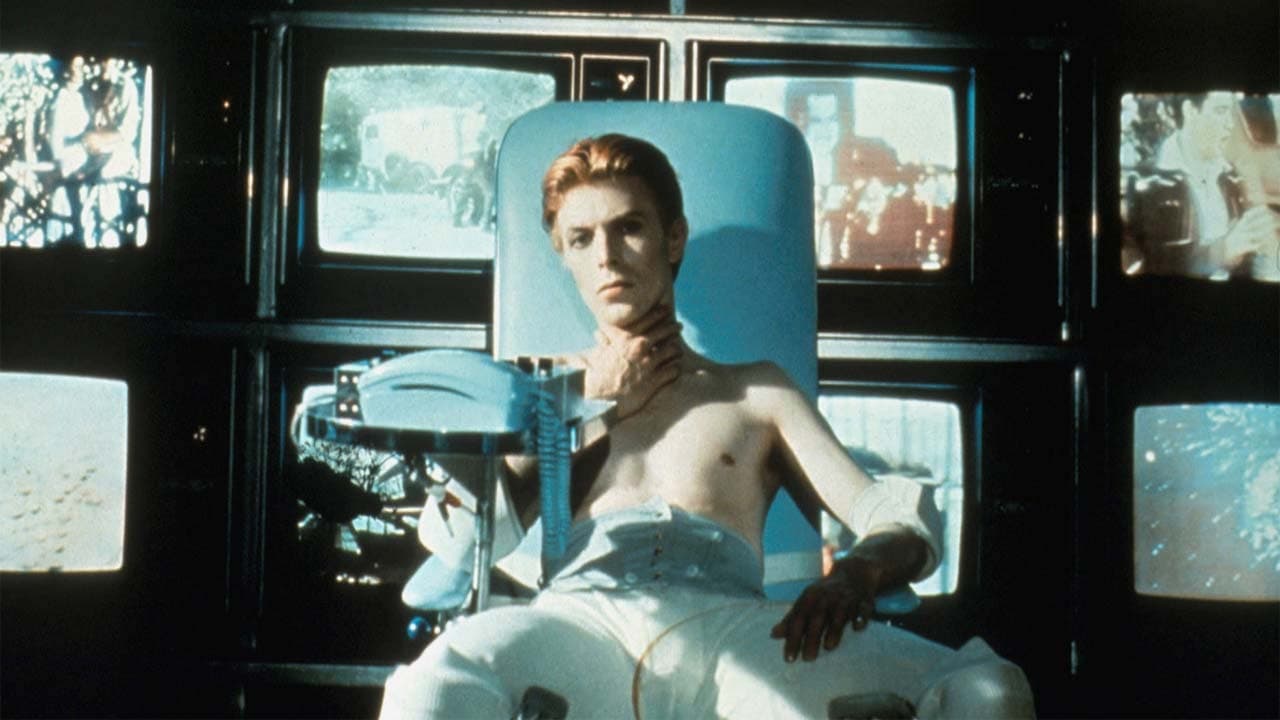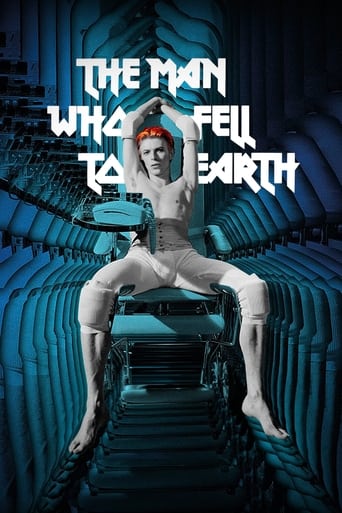Incannerax
What a waste of my time!!!
Beystiman
It's fun, it's light, [but] it has a hard time when its tries to get heavy.
Curapedi
I cannot think of one single thing that I would change about this film. The acting is incomparable, the directing deft, and the writing poignantly brilliant.
Griff Lees
Very good movie overall, highly recommended. Most of the negative reviews don't have any merit and are all pollitically based. Give this movie a chance at least, and it might give you a different perspective.
eliotkeith
This is a film for the experienced cinephile. An average audience will probably get bored. David Bowie is an alien who lands on earth in search of water. This was the legendary singer's first starring role and he more than owns the role of a strange human trying to mix with humans. The surreal imagery by noted director Nicholas Roeg is a highlight and although the film wasn't a big hit either critically or commercially back when it was released, it has a huge following today. If you are a fan of science fiction you should check this out.
Prismark10
Maybe Starman David Bowie was born to play the title role in The Man Who Fell To Earth, an avant-garde disjointed sci fi film from director Nicolas Roeg.Thomas Jerome Newton (David Bowie) is an alien who lands in New Mexico with some precious rings, a British passport and some rudimentary knowledge of patents. He needs to make money so he can build a rocket ship that can transport water to his dying planet.Newton quickly makes money through his advanced business patents, he recruits a chief scientist (Rip Torn) who discovers that he is not what he appears to be and falls in love with hotel maid (Candy Clark) who also introduces him to the delights of gin & tonic.The government intelligence service and rival businesses decide to look closely into his activities. They throw his patent lawyer and business associate (Buck Henry) out of the window and then hold Newton captive in a hotel plying him with gin.The film plays with time as years go by and other characters age. We have flashbacks of Newton in his home planet with his family. The most memorable scenes is that of an alien with a British passport and the famous scene of Clark urinating her underwear when Newton reveals himself as an alien.The film has a cult following but it is not a great film. It is too trippy and unstructured leading you to ask more questions than get any answers from it. Still I cannot think of anyone else who could had played the title role in that era and Bowie goes for it full frontal.However the combination of Bowie and Roeg makes this a landmark science fiction film of the 1970s just as worthy as Close Encounters of the Third Kind.
Alyssa Black (Aly200)
Directed by underrated director Nicolas Roeg and starring in his first lead role is David Bowie, comes this oddball science-fiction of an alien who comes to Earth to find water to save his desolate home planet.David Bowie as Thomas Jerome Newton is fantastically subtle, brooding, gaunt yet handsome, intelligent and mysterious. His motives are sketchy to the film's other players, but become clear by the film's mid-point when his true identity is unmasked by the smaller players in the cast. Bowie keeps his profile low, rarely delving into over-the-top expressions except for moments of intensity. His chemistry with fellow actors Candy Clark (playing his love interest, sometimes to insufferable lengths of whining or trying to play the victim), Buck Henry (playing Bowie's business partner/lawyer-type) and Rip Torn (as a former teacher turned scientist-type and later husband to Candy Clark by the climax) is genuinely believable and maintains humanity as he balances subtle emotion with little reactions (keeping his alien nature present behind his human disguise).The atmosphere is surreal as expected in a Nicolas Roeg film. Ranging from the remote deserts of the southwestern United States to the scenic lakeside home that Thomas Newton builds in the mountainous region of upstate New York , there is a sense of trying to find home. The effects are pretty cheesy in the 1970s standards in being a "B movie", but it works to the degree of being weird; particularly when David Bowie actually showcases his alien makeup which is unsettling. If you need a good science-fiction piece, give this little known gem a watch.
Andy Howlett
I first saw this film in the late 70's and haven't been able to decide to this day whether it is the noodlings of a rather Sixth-Form mentality or a genuine work of art. The story - such as it is - concerns 'Thomas Newton' (Bowie), who appears from nowhere (he's actually from a distant planet) and presents himself to a corporate lawyer with several ground-breaking ideas for new products, all of which earn a massive amount of money for Newton's new company. He needs this money to launch a space program in order to get back to his home planet where his family - and indeed the whole population - is dying from lack of water. SPOILERS FOLLOW. After a great start, his company falters and Newton falls victim to the same frailties that afflict the Humans around him - greed, sleaze, waste and sloth. In the end he has given up his grand scheme and lives his life as a sad drunk, surrounding himself with women, drink and the low morals that come along with them. So the question is - is this film high art or make-it-up-as-you-go-along junk? A deep and biting comment on the human condition or just aimless posturing? Plenty of each, I'd say. But one thing is for certain - it's a very mixed bag, some scenes looking like a million dollars, others like the work of a bored amateur. At least it ends poignantly with Artie Shaw's 'Stardust', which brings the whole thing to a perfect end.

